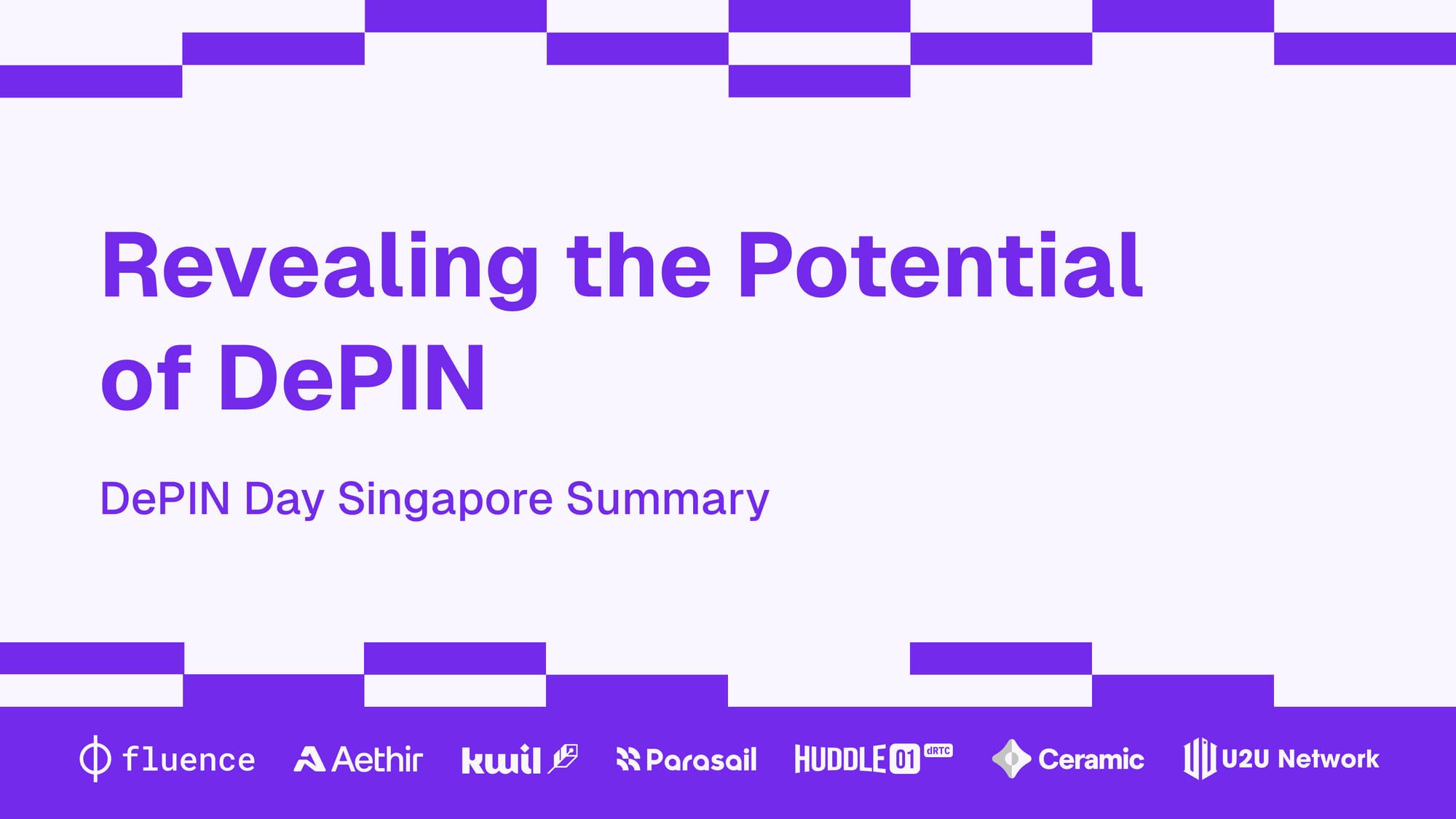Revealing the Potential of DePIN. DePIN Day Singapore Summary

The most recent edition of DePIN Day took place in Singapore, alongside the Token 2049, and was organised by Fluence and Aethir in partnership with Parasail, Huddle01, Kwil, Ceramic and U2U. With over 500 attendees, and 28 speakers presented top DePIN projects such as Helium, xNet Mobile, Silencio, Geodnet, RSS3, Chainbase, Daylight, Dawn, Peaq — this was one of our most successful DePIN Days so far, providing a platform for insightful expert knowledge sharing sessions, panel discussions and networking opportunities.
Read on this recap to find out the key insights from talks and panels 👇
📌 DePIN Token Economics by Tom Trowbridge (Fluence)
The Singapore edition of DePIN Day marked a major milestone for Fluence with the launch of FLT Staking 🔥 Fluence introduced a staking model to enable FLT holders to contribute to decentralized compute resources in a permissionless, community-driven way. Fluence co-founder Tom Trowbridge explained the staking mechanism, highlighting Fluence as a decentralized, resilient, low-cost, green, and verifiable cloudless compute network. He noted that centralized infrastructure currently dominates Web3, which is not sustainable. Fluence addresses this with community-run, low-cost, enterprise-grade CPUs. Tom also emphasized how tokens differentiate DePINs, attract investors, and will evolve into a community-friendly staking model.
Watch the full presentation here
📌 AI Gaming Infrastructure of the Future by Mark Rydon (Aethir)
Mark Rydon, co-founder and CEO of Aethir, discussed the future of AI and gaming infrastructure, highlighting the issue of a massive enterprise GPU shortage.
He explained how Aethir enables easy GPU integration, allowing users to choose GPUs, locations, and quantities, with incentives to use tokens for purchasing compute. Focused on enterprises, Aethir addresses challenges with consumer equipment. Their four main products include AI Training, AI Inference, Game Industry, and Virtualized Compute. Aethir Edge, their new edge computing solution, standardizes hardware and offers scalable potential as more users join.
Watch the full presentation here
📌 The Future of Helium by Noah Prince (Helium)
Noah Prince, Head of Protocol Engineering at Helium Foundation, shared lessons from building one of the most successful DePIN companies. Helium started with IoT (Package Tracking), offering low-bandwidth, long-range devices with long battery life to track locations, explained Noah. Through token incentives, Helium quickly scaled to 400,000 Hotspots across 170+ countries.
Helium V2 expanded into mobile with 5G, but deployment was challenging. Moving from Raspberry Pi to Solana improved scaling but required off-chain reward computation for 400,000 Hotspots. Helium V3 aimed to scale further, introducing Subnetwork utility and a shift back to a single token model. Surprisingly, the community prioritized enabling global wireless networks over decentralizing Oracles. Helium is now decentralizing components such as Ingest, one step at a time.
Watch the full presentation here
📌 Why a User Owned Internet will Bring Crypto to Every Household by Neil Chatterjee (Dawn)
Neil Chatterjee, CEO of Dawn, highlighted the issue with the broadband market, where a few dominant companies control most services.
Andrena, launched in 2018, scaled to 10,000 households across 10 states, with a coverage map of 1.5M households in NYC. Dawn enables user-owned wireless transmitters, allowing users to offer internet directly to each other without centralized providers. Similar to Starlink, Dawn's hardware connects users with extra bandwidth. They also developed a cost-effective Generic Purpose Router for multi-giga routing, avoiding expensive devices.
Watch the full presentation here
📌 Fireside Chat with Christopher Heymann (1kx) and Tom Trowbridge (Fluence)
In this fireside discussion Christopher Heymann founding partner at 1kx and Tom Trowbridge, co-founder of Fluence, reflected on founding 1kx in 2017 and the state of the crypto funding market.
Around that time, during Ethereum's first hype cycle, they discovered the platform they had been seeking — open, permissionless, and censorship-resistant, which was lacking in app stores. They pitched the idea of DePIN to numerous investors. Initially, it seemed counterintuitive to many, but as the sector matured, interest and investments surged. Tom emphasized that founders should embrace reinvention in the VC space, which has evolved. Fluence launched early, attracting promising builders with the right technological expertise and networks, and the founding team met these criteria.
Watch the fireside chat here
📌 Every Chip Counts: Decentralized Cloud Rebellion by Alessandro De Carli (Acurast)
Alessandro De Carli, co-founder of Acurast, a decentralized serverless cloud infrastructure, shared insights on the "every chip counts" movement — a decentralized cloud rebellion. He noted that companies like Google, Amazon, and Microsoft dominate over 70% of the cloud market, meaning most users unknowingly share personal data through these centralized services. "You have no ownership over your own data", — Alessandro explained, leading to mass surveillance and supply chain risks, as these clouds are neither censorship-resistant nor fully decentralized. He emphasized that decentralized, open-source systems can solve the issue of platforms degrading user experience over time.
Watch the full presentation here
📌 Integrating DePIN & AI: Intelligent Optimization and Collective Oversight
The following panel discussion featured Mark Rydon (Aethir), Jeff Chang (RSS3), Maximilian Santner (GM Network), and Luki Song (Chainbase), and was moderated by Amitoj Singh (Coindesk).
The discussion began with how the community views integrating AI with DePIN. Panelists emphasized that DePIN's role in decentralized AI is a journey, reliant on resources like GPUs and bandwidth. Rather than competing with big tech, the focus is on collaboration to optimize DePIN performance for consumers. Open-source AI was highlighted as the future, allowing developers to enhance models. However, stability and privacy in AI-based DePIN projects depend on regulations, which lag behind technological advancements. Incentivizing the secure and private production of user data is key to building trust, with historical data offering valuable use cases, such as health tracking.
Watch the entire panel here
📌 Building Trust and Driving Adoption for DePIN through (Re)Staking by Sylvan Zhang (Parasail)
Sylvan Zhang, founder of Parasail, discussed building trust and driving DePIN adoption through re-staking, sharing lessons learned on establishing on-chain accountability. Parasail helps DePIN protocols implement service-level staking and unlock re-staking and DeFi use cases cost-efficiently. He highlighted challenges in scaling DePIN, particularly around hardware as a core value proposition and building trust in areas like data and compute jobs, which can take months of user education. Another challenge is meeting rising demand and revenue while enforcing SLA requirements. Parasail addresses these issues by enabling service-level staking, permissionless participation, increased liquidity, and broader token distribution.
Watch the full presentation here
📌 Democratising Smartphone Data: How DePIN Will Reach Mass Adoption by Theo Messerer (Silencio)
In his talk on democratizing smartphone data, Theo Messerer, co-founder of Silencio, explained how commodity-based DePINs can attract millions of users and foster collaboration among protocols. Silencio addresses global hearing loss with innovative datasets, offering a free, gamified experience that emphasizes utility for users, regardless of rewards.
Data from noise complaints is collected to create datasets that can be shared with others and government agencies, particularly in consistently loud areas. By democratizing smartphone data, DePINs can scale effectively while solving real-world problems through blockchain technology. Community-driven DePINs offer hyper-scalable infrastructure with low CapEx, broad hardware compatibility, and no supply chain issues.
Watch the full presentation here
📌 Paving the Way to a Greener Future with DePIN
In this panel discussion, Jason Badeaux (Daylight), Greg Sikora (https://x.com/Chain4Energy), Leo Lin (Arkreen), and David Duckworth (Rowan Energy), moderated by Jai Pratap (Cryptonews), explored the possibility of DePIN paving a way to a greener future. They emphasized the importance of tokenomics in empowering communities through DAOs, enabling voting and network growth. Simplifying the installation process, especially for energy DePINs, was noted as key to increasing adoption. Leo Lin explained how Arkreen uses DePIN to link renewable energy from rooftop solar panels, focusing on carbon neutrality and sustainability. The panel also discussed carbon offsetting, tokenization, and encouraging cleaner energy, such as solar, as power grids move towards decentralized models with residential energy resources.
Watch the entire panel here
📌 How Precise Location Enables AI Robots by Mike Horton (Geodnet)
Mike Horton, creator of Geodnet, introduced the world’s largest RTK Network, which delivers centimeter-accurate location data in three dimensions (X, Y, and Z). The system utilizes base stations installed on rooftops that communicate with numerous satellites to provide precise positioning. Traditional infrastructure for such technology is costly and challenging to deploy, particularly in the Western world, but DePIN offers a rapid solution for building high-quality infrastructure. The GEOD Network provides superior coverage and product quality compared to satellite competitors like Trimble and Hexagon, thanks to its quick and easy deployment.
Watch the full presentation here
📌 How to build DePIN: Exploring the Key Pillars of DePINs Infrastructure
The following panel discussion brought together technologists and experts, including Luis Gruson (Kwil), Ayush Ranjan (Huddle01), Ella Jonas (Gelato), and Chloe Phung (U2U Network), with Scott Foo (peaq) as the moderator. Since the release of the influential Messari report, key building blocks for DePINs have been identified as token incentivization for users, a robust infrastructure layer, and an effective middle layer.
Ayush Ranjan highlighted the challenges of high latency during Zoom calls, even with internet speeds of 25 Mbps, emphasizing the critical need for low-latency solutions to foster immersive communication. In response, Chloe Phung pointed out that to compete with established services like AWS and Google Cloud, applications must prioritize both low latency and high transaction throughput. Chloe Phung shared how the U2U network employs the DAG (Direct Acyclic Graph) model, which not only maintains performance during market fluctuations but also considers interoperability with subnets to enhance communication between networks. Together, these insights illustrated the importance of addressing latency and scalability in building a successful DePIN infrastructure.
Watch the entire panel here
📌 The next 100B TAM: Building real-world demand in DePINs by Richard DeVaul (xNet Mobile)
Richard DeVaul, CEO and co-founder of xNET Mobile, a decentralized carrier-grade network, discussed the upcoming revolution in DePIN to meet real-world demand.
As data demand surges, centralized mobile network operators are reaching capacity limits, making wireless connectivity increasingly valuable.
To address these challenges, xNET combines rooftop CVRS radios and Wi-Fi technology to create the world’s first neutral network for over 3 million users. Richard emphasized that building a successful DePIN company requires a deep understanding of the industry, solving real-world problems, and offering a superior, cost-effective alternative to centralized competitors. He concluded that for DePIN to revolutionize the market, collaboration with existing players is essential. By designing for demand from the beginning, attracting users becomes much easier.
Watch the full presentation here
📌 Exploring the Untapped Potential of DePIN: A New Frontier in Web3
The panel featured Jun Park (Hashed), Anna Bertha (DCG), Vinayak Kurup (EV3), and Rob Schmults (Blockchange Ventures), who discussed the untapped potential of DePIN as a new frontier in Web3. DePIN is exciting because it allows for the incentivization and utilization of high-capex resources in oligopolistic sectors like energy, serving as a historical catalyst to solve software scalability issues. The panelists emphasized the need for complementary founders with industry experience to achieve product-market fit, particularly in networks leveraging existing hardware and edge devices with effective crypto tokenomics for long-term success. Jun Park noted that UI/UX is a major bottleneck, elongating the onboarding process for new users and resulting in a conversion rate of about 0.5%.
Watch the entire panel here
The inspiring discussions at the recent edition of DePIN Day in Singapore showcased the transformative potential of Decentralized Physical Infrastructure Networks in various sectors.
Some of the key highlights include an observation that DePIN with AI is an ongoing journey, emphasizing collaboration over competition with established tech companies to enhance performance and build trust through secure, private user data production. The key components for successful DePIN infrastructure highlighted by our speakers include user token incentivization, a robust infrastructure layer, and low-latency solutions that improve user experiences, especially in communications. Experts recognized that DePIN can incentivize high capital intensive industries, such as the energy sector, and provide a much-needed catalyst for scalability in software and computing. The challenge of low conversion rates due to UI/UX bottlenecks was addressed, underscoring the importance of user-friendly designs. Furthermore, our guests talked the significance of having experienced founders in achieving product-market fit in the DePIN ecosystem.
Overall, the Singapore edition of DePIN Day served as a vital platform for sharing insights on the future of decentralized technologies, encouraging participants to embrace reinvention and collaborative efforts in this evolving landscape.
We would like to thank all our partners: Aethir, Parasail, Huddle01, Kwil, Ceramic and U2U Network for helping us to make this event a success. Don't miss the future editions of DePIN Day — follow us on Twitter to stay in touch and stay tuned for the Bangkok edition coming on November during Devcon Week.


